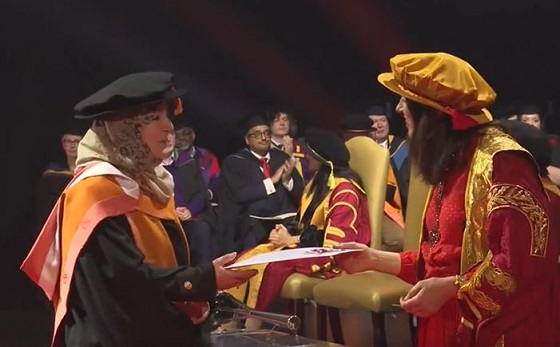It is safe to say receiving a PhD from De Montfort University Leicester (DMU) is a remarkable achievement, rewarding years of rigorous research involving dedication and perseverance.
But, for the newly qualified Dr Hala Elmajnoun, there is no doubt the PhD she received at DMU’s graduation ceremonies last week felt that little bit more special after COVID almost ruined her studies.

Dr Elmajnoun receives her PhD from Vice-Chancellor Prof Katie Normington
Dr Elmajnoun, a medically-trained doctor from Libya, had spent 18 months travelling the length and breadth of England to set up an investigation into how intermittent fasting during Ramadan, by young Muslims with type 2 diabetes, might impact their health.`
She spoke to communities in Leicester, London, Birmingham and Bradford, as well as those cities’ mosques, health trusts, doctors and schools, to be able to monitor young people via meetings, surveys and regular blood samples before, during and after Ramadan.
Her PhD proposal had also been scrutinised and given the go-ahead by the university’s own ethics committee.
Dr Elmajnoun was excited to be entering into her own unique research project with the potential to help hundreds of young people. Then COVID hit.
The resulting UK lockdown turned all of her best laid plans to nothing – just as it was doing for tens of thousands of others.
There was also an added pressure for Dr Elmajnoun as her stay in Leicester was sponsored by the Libyan government for a maximum of three years.
RELATED NEWS
Find out more about studying a PhD at DMU
Find your new home at DMU - come to our next Open Day
Relive your moments at graduation - visit our Facebook galleries
It meant Dr Elmajnoun, her husband and daughter were facing the prospect of going back to Tripoli with nothing to show for the move to England. The stress was further compounded by the fact Dr Elmajoun was pregnant with her second child.
“I received an email saying all planned face-to-face meets with the school students had to be stopped which meant no surveys, blood samples, assessments...,” Dr Elmajnoun explained.
“I had spent 18 months getting everything set up and then we could not carry on. It was a bit of a shock. I had been really excited about all the support I was getting across the UK to make this happen. We were set to go. Then that was that.”
This was when her DMU supervisors Prof Parvez Haris and Dr Abu-Bakr Abu-Median stepped in to help. They discussed how to continue with the PhD by changing the way it was researched under COVID restrictions and continue to complete the qualification without compromising the high standards and scrutiny needed.
Dr Elmajnoun said: “Both of my supervisors are amazing people and I was lucky to have them on this journey with me. I was facing great challenges and they were a great support.
“I formed such great relationships with them. After spending four years working together, they are like two members of the family.”
As the funding from Libya came to an end, Dr Elmajnoun’s husband got a job working night shifts.
“He was so supportive,” says Dr Elmajnoun. “He would finish a night shift and then, instead of sleeping, he would look after the new baby and our daughter. Coming out of COVID and dealing with the cost of living was a huge challenge. It was real pressure. I also worked as a supervisor for DMU students completing their master’s degree. It was so good to support other students who were going through the same thing.

Dr Elmajnoun crosses the Curve stage to receive her PhD
“As an international student with a family, I found good people at DMU who supported me mentally as well as academically. By the time the four years had ended I was exhausted. But we all got through it.”
Supervisor Prof Haris said: “Woking with my PhD students during the pandemic was the most stressful and challenging time in my research career.
“I had to help them adapt projects to carry out innovative work without compromising the high standards required for a doctoral degree.
“I had to motivate myself and the students so they could continue their studies despite all the uncertainties and an atmosphere of worry and fear.
“Supervising Hala was an enjoyable experience. We had to work hard to adapt her project so that Hala could work remotely and still generate high quality data. She did incredibly well to complete her PhD after facing so many challenges.”
Dr Elmajnoun added: “I have enjoyed my time in Leicester. I really like the weather here. It is too hot in my country. I like it when it rains!
“I have had such a good time here and I have learned so, so much. I am very grateful and very proud.”
Posted on Tuesday 30 January 2024